2020: A brutal siege
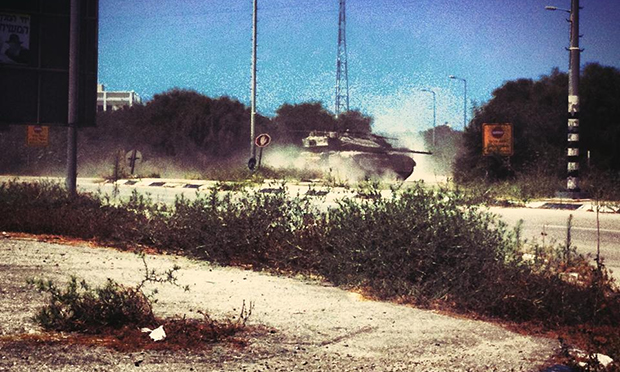
As a doctor working in East London, one of the worst affected centres of the coronavirus pandemic, I see striking parallels with our current predicament under lockdown and those from my experience working in the Gaza strip back in 2014.
I had a unique invitation to visit Gaza City six years ago. That June, I set off via Tel Aviv to work with the Liverpool International Transplant Initiative, an organisation which works collaboratively with British and Palestinian doctors.
I proceeded from Jerusalem to the Israel crossing point at Erez just as two Israeli Merkava tanks were also rolling up to the border with Gaza.
The siege of Gaza has been ongoing since 2006, confining just under two million people into a parcel of land measuring 365 square kilometres. This siege has led to extreme poverty, high unemployment and widespread food insecurity.
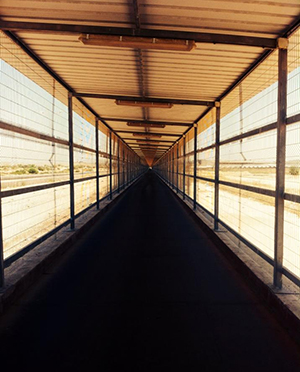
No Man’s Land, 2014.
Photograph: Patrick Bogue
There are many notable parallels when we consider the experience of our lives under lockdown in 2020, including restrictions on our freedom of movement and access to essential services and jobs.
The Erez crossing is restricted to all but diplomats, humanitarian workers and those granted special entry or exit permission from the Israeli military.
The crossing is a heavily militarised, empty, airport-like experience but the tranquil sound of birdsong as one passes through No Man’s Land from Israel to Gaza is the last thing you expect in a war zone.
Today, during the lockdown, as birdsong returns to our parks, I listen out on my cycle to work and ask whether I can differentiate the song of a blackbird from the Sinai rosefinch.
In July 2014, the delights of the Ramadan respite were abruptly ended as a war erupted between Israel and the Hamas-led Palestinian enclave.
In a busy Gazan café overlooking the Mediterranean we began to hear the unmistakable tremble of an F-16 fighter jet roaring above. It started bombing heavily that night.
The TV flickered through different stages of static; the Algeria versus Germany World Cup football match now scrambled by military drones overhead.
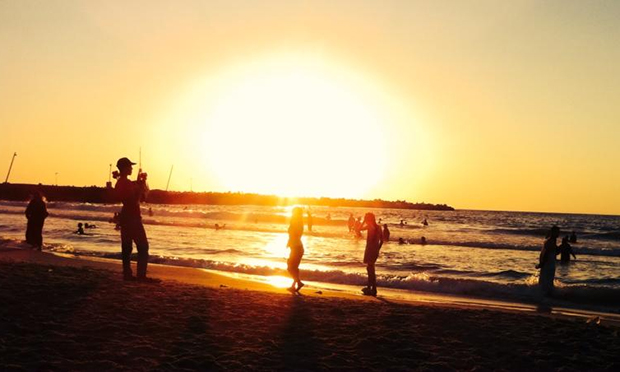
Photograph: Patrick Bogue
We made a quick exit by taxi and my Palestinian colleague laughed at me as I reached across to buckle my seatbelt.
There are 32 hospitals in the Gaza strip and Al-Shifa is the largest central one. It has over 200 doctors and six operating theatres.
In London alone, there are over 60 hospitals with many thousands of NHS staff.
The NHS Nightingale, opened temporarily in London’s docklands, was ostensibly capable of providing care for a couple of thousand people, but in reality had to turn patients away due to the severe shortage of specialist ITU nurses as a result of the chronic underfunding of nursing training in the UK.
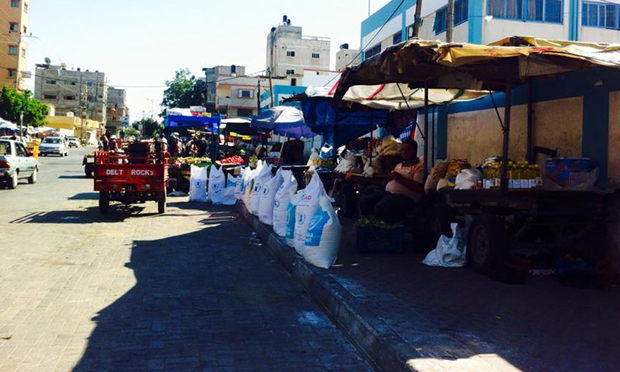
Before and after the Gazan war of 2014, Palestinian healthcare professionals were working without a salary for several months, demonstrating a remarkable and selfless sense of duty.
Similarly, our NHS staff today redeploy to frontline specialties without adequate provision of personal, protective equipment (PPE).
Even if underprepared, we are privileged enough to count on regular salaries coming in every month when others in society are not so fortunate. We also count on local collectives stitching our new scrubs and 3D-printing visors to keep us protected.
The increased strain on the UK’s medical supply system is evidenced through dwindling numbers of essential anaesthetic drugs, oxygen and stockpiles of PPE.
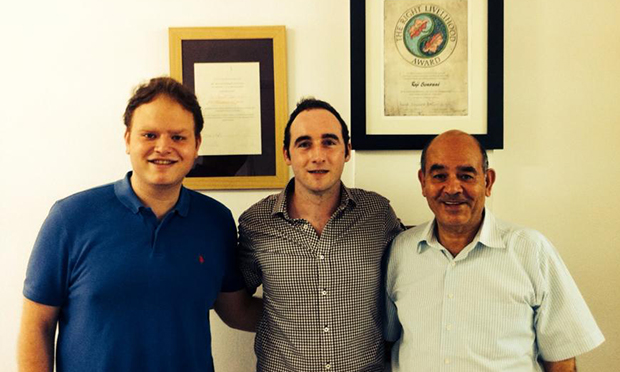
Photograph: courtesy Patrick Bogue
What do we do when hospital supplies run low on essential resources? Coronavirus has raised difficult ethical questions about the provision of limited resources and caused understandable anger about our lack of preparedness.
These questions are a daily occurrence in resource-limited environments such as that in Gaza.
One example I noted on the Al-Shifa doctor’s rounds was that a 72-hour course of intravenous treatment for a male patient with a bleeding stomach ulcer was rationed to only 24 hours, his mortality postponed for another day.
I have not yet had to make such a decision working in London, but in many places coronavirus has pushed us to the limit.
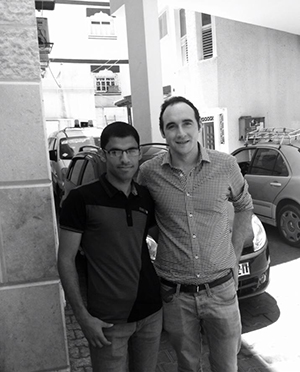
and guide who helped by working as Patrick’s
Arabic interpreter during his visit to Gaza.
Photograph: courtesy Patrick Bogue
Our Gazan counterparts also ration electricity, food, water and fuel, relying on reaching out to us through international diplomacy and gratefully receiving humanitarian aid.
Al-Shifa hospital is used to running on short supplies and is chronically reliant on back-up ‘emergency’ generators.
Whilst we haven’t quite reached those critical levels of scarcity here in the NHS, I keep asking myself which of my patients are relying on local food banks and what can we do as a society to prevent this from happening again?
The London boroughs of Newham, Hackney and Tower Hamlets are the worst hit by coronavirus and consistently top the charts of child poverty, unemployment and chronic ill health: this is no coincidence.
In 2020, citizens of the UK take shelter in tower blocks and tenements, staying at home for safety.
The virus is both indiscriminate and focused on targeting the most vulnerable within our community: those of Black and ethnic minority (BAME) status, living in overcrowded flats with poor ventilation, inadequate nutrition or sanitation.
Coronavirus disproportionately affects the poorest at a ratio of almost two to one.
The virus has had an indirect, hidden and sinister effect on our minds as both fear and loss of normality exerts its toll.
Increasing rates of mental stress are seen as people suffer from the loss of contact with their family and carers, loss of routine, anxiety about the future, disruption to education and, in some cases, traumatic experiences such as domestic violence at home.
Gaza’s overcrowded neighbourhoods were shelled constantly throughout the summer of 2014, leaving thousands seeking shelter in the only places they trusted were secure: hospitals, schools and clinics.
Even in those sacred places, many people lost their lives due to an indiscriminate Israeli bombardment and the subsequent military invasion.
In Gaza, one of the main barriers to health is the political stalemate between those in power.
Similarly, elements of the UK pandemic response could have been implemented better and years of austerity under consecutive Conservative governments has left us vulnerable.
A return to any kind of normality for all of us would be welcomed but in reality it is far off.
Unless we demand a more cohesive, transparent and renewed approach through urgent political action both here and abroad, the injustices of extreme poverty will continue to put lives at risk and leave us vulnerable to subsequent pandemics.
The main similarities between life in East London under lockdown and the siege of Gaza seem to be the inherent human ability to adapt and survive, amidst the adversity which we face.
I hope for humanity’s sake that these sieges are lifted soon and we can work together to build a fairer society.
If Gazans teach us anything from living under the siege, it is to reach out from isolation.
Patrick Bogue is a medical doctor currently working in East London. He would like to extend his sincere thanks to King’s Conflict and Health Research group, Liverpool International Transplant Initiative, the Royal Society for Asian Affairs, alongside his colleagues in the UK and Gaza.
